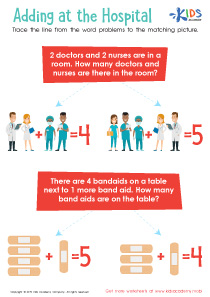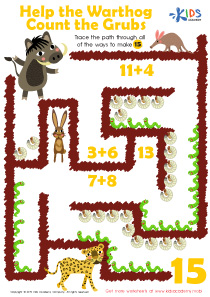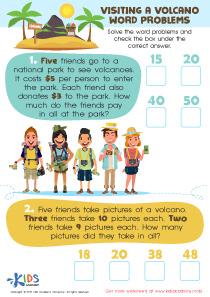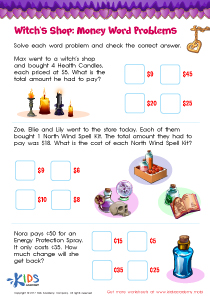Logical Reasoning Normal Kindergarten Two-step Word Problems Worksheets
3 filtered results
-
From - To
Our "Logical Reasoning Normal Kindergarten Two-step Word Problems Worksheets" are designed to enhance young learners' critical thinking and problem-solving skills. These engaging worksheets challenge kindergarten students to solve two-step word problems using logical reasoning, improving their math abilities while fostering essential cognitive development. Perfectly suited for classroom or at-home practice, these activities encourage kids to break down problems, make connections, and apply their understanding in a structured manner. Ideal for keeping learning fun and interactive, these printable worksheets are an excellent resource for building a solid foundation in math and logical thinking for kindergartners.


Enrichment -2 Step Word Problems Worksheet


Solve the Problem: Trick–or–treating Worksheet


Addition and Subtraction: Word Problems Worksheet
Logical reasoning and two-step word problems in kindergarten serve as foundational elements for young students' cognitive development. Parents and teachers should place high importance on these skills because they contribute significantly to a child's critical thinking and problem-solving abilities.
First, engaging with two-step word problems helps children learn to break down complex tasks into manageable parts. This skill is not only vital in academics but also in everyday life, aiding in activities that require planning and sequence, such as following recipes or organizing tasks.
Second, these problems enhance logical reasoning skills. Children learn to recognize patterns, understand relationships between different pieces of information, and make connections. Logical reasoning fosters analytical thinking, enabling children to solve puzzles and navigate challenges more effectively.
Third, these activities build confidence and resilience. Success in tackling gradually increasing challenges generates a sense of accomplishment, encouraging a positive attitude towards learning. Overcoming difficulties enhances perseverance, crucial for lifelong learning.
Finally, early exposure to logical reasoning promotes better performance in future academic pursuits, particularly in mathematics, science, and coding, which rely heavily on these foundational skills. Nurturing these abilities early ensures that children are well-prepared for more advanced subjects, setting them up for future academic success.
 Assign to My Students
Assign to My Students











